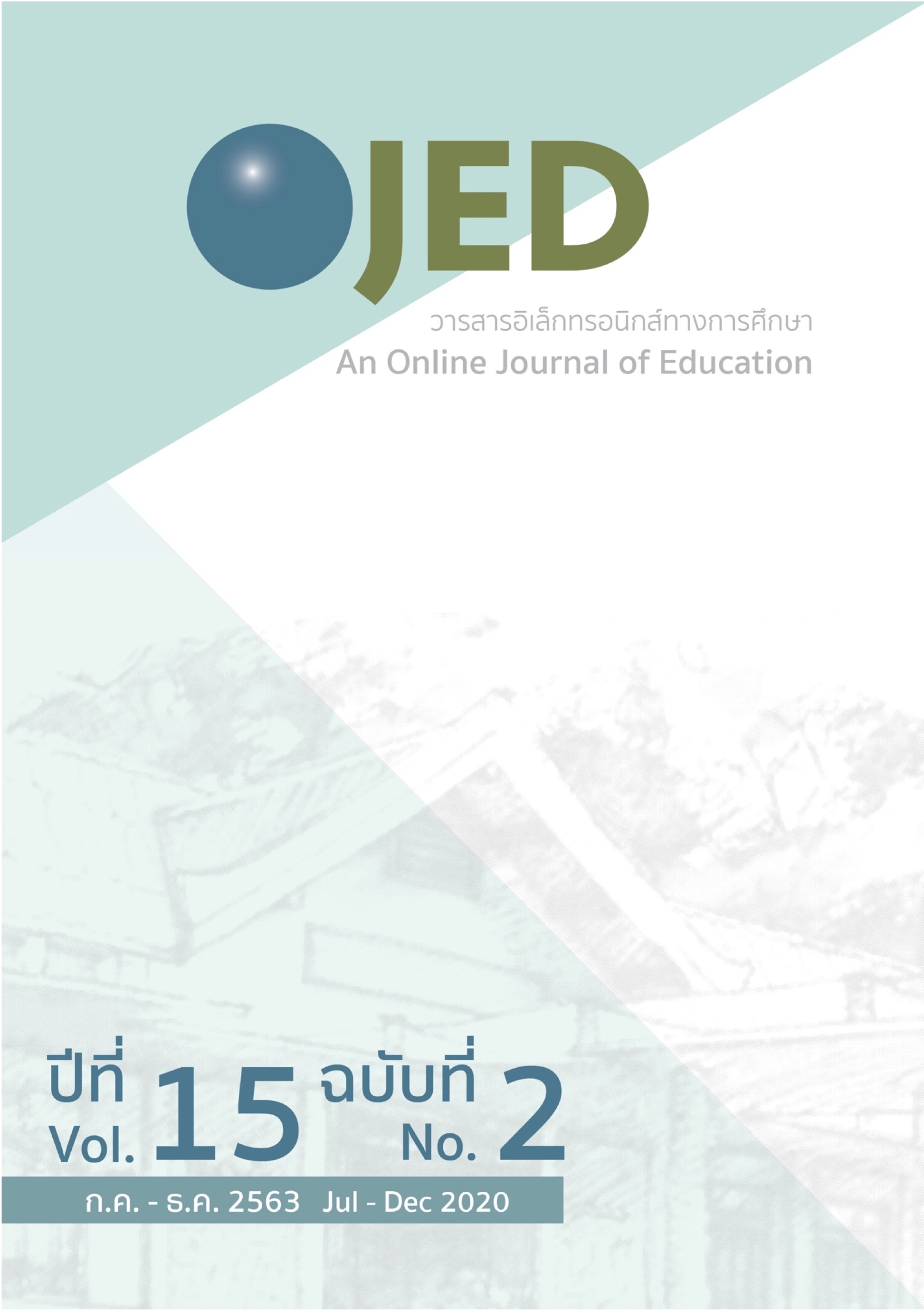Guidelines for Development of Teachers’ Core Competencies in Schools Under the Secondary Educational Service Area Office 17
DOI:
https://doi.org/10.14456/ojed.2020.20Keywords:
guidelines for development of teachers’ core competencies, Secondary Educational Service Area Office 17Abstract
This research aimed to examine teachers’ core competencies and propose guidelines for development of them in schools under the Secondary Educational Service Area Office 17. The population included a total of 984 persons who were school administrators and teachers in schools under the Secondary Educational Service Area Office 17. The sample in the questionnaire was 278 teachers chosen by stratified random sampling. The sample in the interview consisted of 8 school administrators and teachers chosen by purposive sampling. The tool used in research was the questionnaire and interview form. Data were analyzed by frequency, percentage, mean, standard deviation and content analysis.
According to research results, a high level of the overall picture of was found (M = 4.04, SD = 0.68). The execution level of core competencies in light of ethics and teachers’ professional code of ethics was at the highest level (M = 4.53, SD = 0.57). The second core competencies were in good service and its level of execution was at a high level (M = 4.23, SD = 0.67). Respecting core competencies in terms of teamwork, its level of execution was at a moderate level (M = 3.09, SD = 0.75). It's the last thing needing to develop the most. Guidelines for development of teachers’ core competencies were as follows: 1) school administrators support teachers’ teamwork, build teachers’ networks, organize a mentor system, implement a coaching system and have a supervision and monitoring system in place; 2) teachers continually engage in self-development by means of self-learning, attending training or furthering education, and creating professional learning communities; and 3) schools promote teacher developments through field studies, seminars and training as well as create inter-organizational learning networks.
References
กัญญ์วรา ผลเจริญ. (2559). การศึกษาสมรรถนะหลักของครูโรงเรียนสันติราษฎร์วิทยาลัย สังกัดสำนักงานเขตพื้นที่การศึกษามัธยมศึกษา เขต 1 [งานนิพนธ์ปริญญามหาบัณฑิต]. Burapha University Library (BUU Library). http://digital_collect.lib.buu.ac.th/dcms/files/56990075.pdf
ชาญชัย รัตนสุทธิ. (2552). การพัฒนาความเป็นมืออาชีพของครูด้วยกระบวนการเสริมสร้างพลังอำนาจในโรงเรียนสังกัดสำนักงานเขตพื้นที่การศึกษาอุดรธานีเขต 4 [วิทยานิพนธ์ปริญญาดุษฎีบัณฑิต, มหาวิทยาลัยมหาสารคาม]. Thai Library Integrated System (ThaiLIS).
บุรินทร์ รุจจนพันธุ์. (2556). เกณฑ์การแปลความหมาย Likert. https://www.thaiall.com/blog/tag/likert/
บุญชม ศรีสะอาด. (2545). การวิจัยเบื้องต้น (พิมพ์ครั้งที่ 7). สุวีริยาสาส์น.
บุญหนุน ซาเสน. (2558). การพัฒนาสมรรถนะหลักครูของผู้บริหารโรงเรียนประถม สังกัดสำนักงานเขตพื้นที่การศึกษาประถมศึกษากาญจนบุรี เขต 4 [การค้นคว้าอิสระปริญญามหาบัณฑิต]. ข้อมูลวิทยานิพนธ์ มหาวิทยาลัยราชภัฏกาญจนบุรี (KRU E-Thesis). http://ethesis.kru.ac.th/files/V59_96/abstract.pdf
พชรวิทย์ จันทร์ศิริสิร. (2560). การพัฒนาสมรรถนะหลักและประสิทธิภาพในการทำงานของข้าราชการครูในภาคตะวันออกเฉียงเหนือ. สุทธิปริทัศน์, 26(100), 144-158.
สมนึก ภัททิยธนี. (2544). การวัดผลการศึกษา. ภาควิชาวิจัยและพัฒนาการศึกษา คณะศึกษาศาสตร์ มหาวิทยาลัยมหาสารคาม.
สำนักงานคณะกรรมการพัฒนาเศรษฐกิจและสังคมแห่งชาติ. (2561). แผนพัฒนาเศรษฐกิจและสังคมแห่งชาติฉบับที่ 12 (พ.ศ.2560-2564). สำนักงานตำรวจแห่งชาติ. http://www.royalthaipolice.go.th/downloads/plan12.pdf
สำนักงานเขตพื้นที่การศึกษามัธยมศึกษาเขต 17. (2561). รายงานการสังเคราะห์ผลการตรวจสอบและผลการประเมินคุณภาพภายในของสถานศึกษา ระดับการศึกษาขั้นพื้นฐาน ปีการศึกษา 2560. http://www.sesa17.go.th/site/images/SAR%202560.pdf
สำนักพัฒนาครูและบุคลากรทางการศึกษาขึ้นพื้นฐาน. (2553). คู่มือประเมินสมรรถนะครู (ฉบับปรับปรุง). กระทรวงศึกษาธิการ.
สำนักงานเลขาธิการสภาการศึกษา. (2553). ข้อเสนอเชิงนโยบายการพัฒนาครูและบุคลากรทางการศึกษา. สำนักงานเลขาธิการสภาการศึกษา.
Best, J. W. (1981). Research in education. Prentice Hall.
Huse, E. F., & Cummings, T. G. (1985). Organizational development and change. West Publishing Company. https://www.researchgate.net/publication/323445228_Organization_Development_Change_8th_Edition
Krejcie, R. V., & Morgan, D. W. (1970). Determining sample size for research activities. Educational and Psychological Measurement, 30(3), 607-610. http://www.fsh.mi.th/km/wp-content/uploads/2014/04/resch.pdf
McClelland, D. (1973). Testing for competence rather than for intelligence. American Psychologist, 28(1), 1-14. https://www.therapiebreve.be/documents/mcclelland-1973.pdf
Downloads
Published
How to Cite
Issue
Section
License
Copyright (c) 2020 An Online Journal of Education

This work is licensed under a Creative Commons Attribution-NonCommercial-NoDerivatives 4.0 International License.




